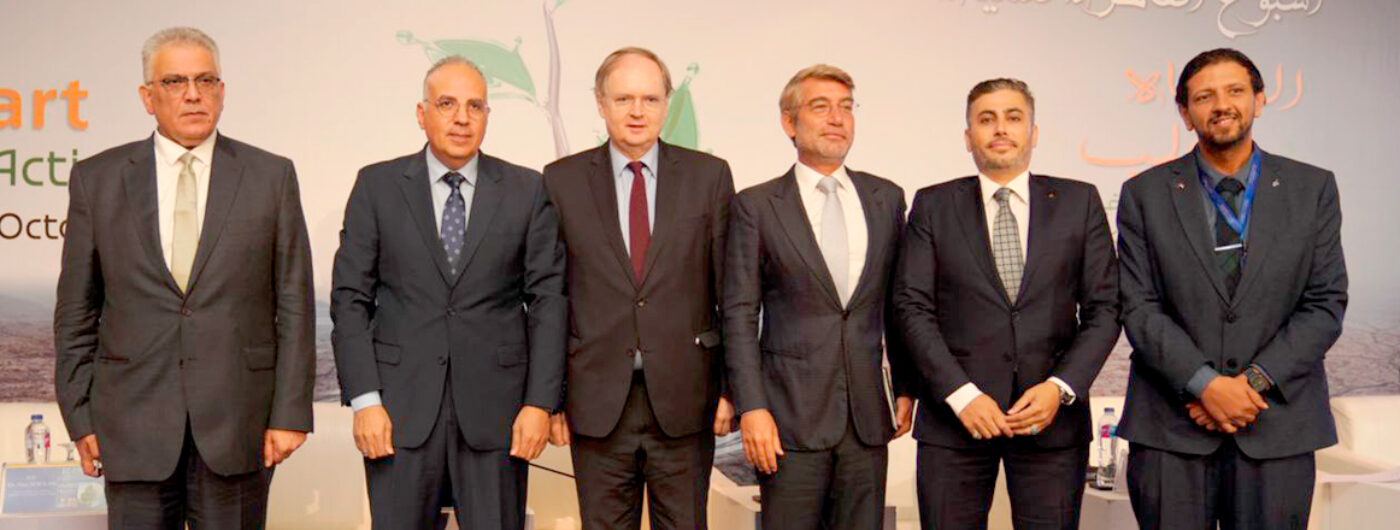
The Mediterranean water sector comes together to address the financial realities imposed by climate change
- EU-UfM High Level Conference on strengthening water finance and investment policies under climate change takes place in Cairo (Egypt) as a prelude to COP-27.
- The EU and the Union for the Mediterranean are committed to supporting UfM countries in developing and strengthening their water investment and finance policies.
- There is a need to act on exploring, advancing and implementing the means of leveraging finances, developing and transferring technology and building capacities on national and regional levels.
Cairo, 17 October 2022 – As water is the sector most heavily hit by climate change in the Mediterranean region, governments need to address some fundamental finance questions to ensure water security. The region warms 20% faster than the rest of the world. Freshwater availability is set to decrease by 15%. Within 20 years, more than 250 million people will be classified as “water-poor”. Regional discussions about water and climate change often focus on technical solutions and investment projects, and not enough on how water sector policies need to evolve to face the new financial realities imposed by climate change. The cost of ensuring water for all is increasing and it is not clear how it will be paid for. What are the additional costs that climate change imposes on water management? How can we attract climate finance to cover some of those costs? How can we engage with public and private financiers? Are current water investment policies adapted to the financial realities imposed by climate change? Do investments in new water sources, such as water re-use, make economic sense?
The EU-UfM High Level Conference on Water Finance and Investment took place on 17 and October to address those questions and elaborate a high-level action plan that will be further discussed at COP-27 and the 2023 UN Water Conference. The conference was jointly organised by UfM and EU in partnership with the Egyptian Ministry of Water Resources and Irrigation, and financially supported by the Swedish Cooperation Agency Sida, in the framework of the Cairo Water Week. The conference brought together 50 speakers, including the water ministers from Egypt, Lebanon and Palestine, the Secretary General of the Jordanian water ministry, the directors-general for water from Slovenia, Spain, and Türkiye, the Special Envoy for Water from the Netherlands, and the top FAO official for the Near East and North Africa are attending the conference. They were joined by government and EU officials from several UfM member states and experts from four regional water networks (AWEN, GWP-Med, IME, INWRDAM), four international financial institutions (AFD, EBRD, EIB, IFC), EurEau, OECD, SIWI, Water Aid, and the Union of Arab Banks.
UfM Deputy Secretary General Almotaz Abadi declared at the conference and the launch of activities that the UfM has been leading the charge of improving finance and investment policies for water security in the Mediterranean. UfM member states developed in 2018 the UfM Financial Strategy for Water, and the UfM has supported stronger national leadership and regional cooperation though national workshops and regional events. “I am proud to be here today to help launch this conference, which represents both a means and an outcome of regional cooperation. I’m particularly grateful to Sida, and EU for helping us bring all those experts and high level officials here, to Egypt for hosting us again, and to the EU Delegation in Cairo for a partnership that started four years ago and has been, being and will always be consolidated to offer what I think it is nowadays the prime annual event addressing water finance and investment issues in the Mediterranean and the first of its kind Pre COP27 activity”.
Christian Berger, Head of the European Union Delegation to Egypt proclaimed that “the EU and the Union for the Mediterranean are committed to supporting UfM countries in developing and strengthening their water investment and finance policies “who added that “new regional events like this are a great opportunity and the EU has a long-lasting commitment to work in the Mediterranean region. Moreover, Team Europe initiatives on water across the Mediterranean will offer opportunities leading the way towards a sustainable future.”
Hani SEWILAM, Minister of Water Resources and Irrigation, Egypt recalled that “the UfM ministerial declaration in 2017 on water, prioritizing the development of a regional Water Agenda while developing a Financial Strategy aims to facilitate investment in the fields of access to water. He asserted that there is a “need to act on exploring, advancing and implementing the means of leveraging finances, developing and transferring technology and building capacities on national and regional levels”.
The two-day High-Level Conference comprised the following sessions:
- Climate, Water and Finance: Implications for the Financial Sustainability of the Mediterranean Water Sector
- Attracting Climate Finance for Water
- UfM Regional Dialogue on Water and Finance: Engaging Public and Private Financiers
- Improving Water Investment Policies under Climate Change
- Team Europe Initiatives on Water
- Investing in Water to Adapt to Climate Change: Focus on Water Reuse
- Ministerial Level Segment — Conference Recommendations for COP-27
Water-related issues are among the most complexes challenges that our region is facing. This prompted UfM member states to join forces to develop the UfM Water Agenda 2030 as a regional policy response to the high priority of water issues in the Mediterranean. The Water Agenda offers means for substantial and measurable positive impact towards meeting the Sustainable Development Goals (SDGs).
As we approach the date of the next Climate Conference COP 27 in Sharm el-Sheikh, governments around the Mediterranean are focused on how to bring about decisive actions to meet their environmental challenges and tackle climate change. Climate-resilient water investments are needed especially in arid and developing countries to support water-wise adaptation.
Conclusions – the Cairo Action Agenda on Water Finance and Investment for Climate Resilience
